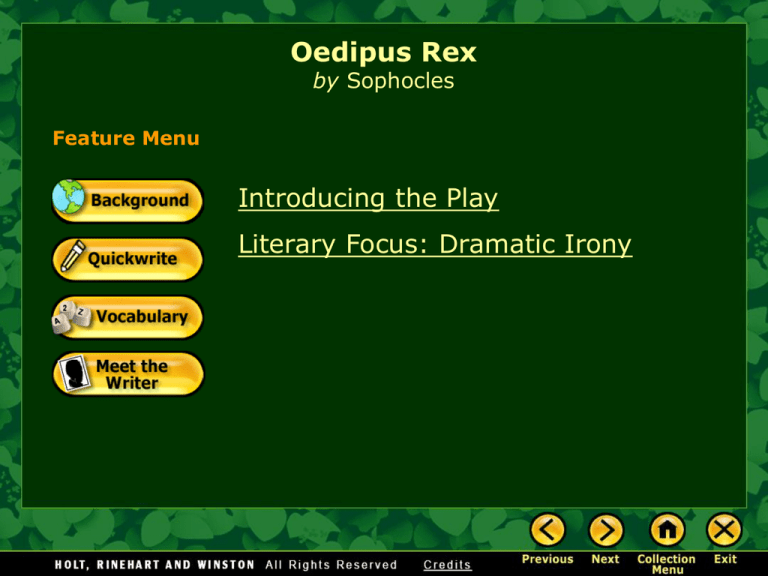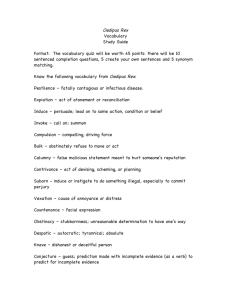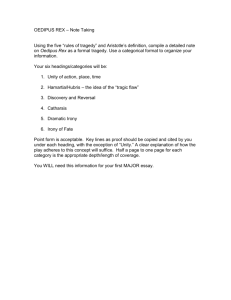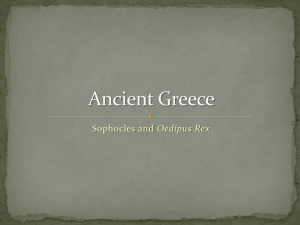Oedipus Rex
advertisement

Oedipus Rex by Sophocles Feature Menu Introducing the Play Literary Focus: Dramatic Irony Oedipus Rex by Sophocles King Polybus Rescuing Oedipus Oedipus Rex by Sophocles Oedipus Rex is considered one of the world’s greatest tragedies. Oedipus Rex by Sophocles A tragedy is a serious drama featuring a hero or main character, often of noble birth, who strives to achieve something and is ultimately defeated. “Let them all hear it. It is for them I suffer, more than for myself.” Oedipus Rex by Sophocles The hero’s downfall is often due to an inborn character flaw or weakness—the tragic flaw. “After exposing the rankness of my own guilt, how could I look men frankly in the eyes?” Oedipus Rex by Sophocles Despite defeat or even death, the tragic hero is ennobled by new self-knowledge and wisdom. “Ah dearest ones, I had neither sight nor knowledge then . . .” Oedipus Rex by Sophocles The structure of most Greek tragedies presents a tight, formal arrangement of parts, and Oedipus Rex maintains this tight dramatic framework. • Prologue • Parados • Dialogue • Choral odes • Exodos The Colosseum, Rome, Italy Oedipus Rex by Sophocles Oedipus Rex is one of Sophocles’ three “Theban plays”—three tragedies about King Oedipus of Thebes and his family. • Antigone • Oedipus Rex • Oedipus at Colonus Oedipus Rex by Sophocles Oedipus is the ill-fated king of Thebes whose mysterious past wreaks havoc on all—his family, his kingdom, and Oedipus himself. Before the play begins, Oedipus has won the right to marry Queen Jocasta by solving a riddle posed by the Sphinx. The Sphinx at Giza, Egypt Oedipus Rex by Sophocles Queen Jocasta’s husband, King Laius, had been killed on the road by an unknown traveler. This unsolved slaying brings a plague on Thebes. King Oedipus vows to find Laius’s killer and bring him to justice. Temple of Luxor, Thebes Oedipus Rex by Sophocles The themes, or underlying messages, of Oedipus Rex include • the quest for identity • the nature of innocence and guilt • the nature of moral responsibility • the limitations of human will versus fate • the abuse of power [End of Section] Oedipus Rex Literary Focus: Dramatic Irony Dramatic irony occurs when the reader or audience knows something important that a character in a story or drama does not know. “Murder of whom? Surely the god has named him?” Oedipus Rex Literary Focus: Dramatic Irony The fundamental irony in the play stems from the audience’s knowledge of Oedipus’s true identity, of which Oedipus is completely unaware. “What is God singing in his profound Delphi of gold and shadow? What oracle for Thebes, the sunwhipped city?” Oedipus Rex Literary Focus: Dramatic Irony Sophocles creates variations of this central irony throughout the play, heightening the audience’s pity and horror. The main characters gradually come to grips with what the audience knows from the very start of the play. Greek amphitheater Oedipus Rex Literary Focus: Dramatic Irony What is left unsaid is often more powerful than what is explicitly stated. Almost every line of the play contains an ambiguity or double meaning. “Then once more I must bring what is dark to light.” This verbal irony reinforces the dramatic irony of the play as each character discovers the truth of Oedipus’s identity. [End of Section]





